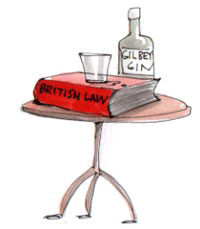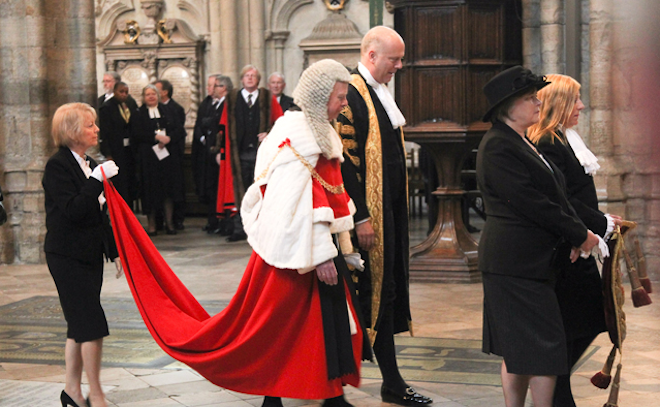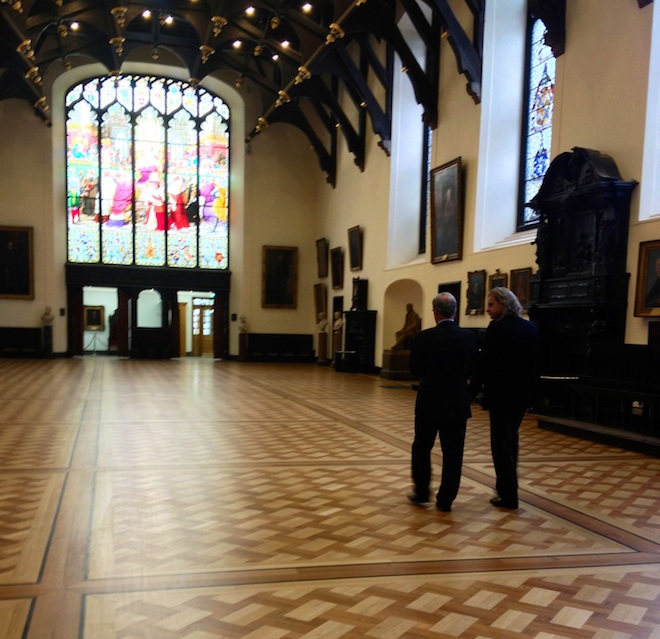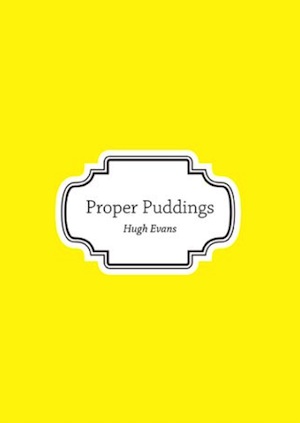Things can only get worse ... Courts in a muddle about technology ... Dame Heather Hallett on Australian subtlety ... Parliament Hall, Edinburgh ... Professional liability barrister authors recipes for Proper Puddings ... Leverhulme's London Calling
 I should like to get through this piece without mentioning Noel Coward's most famous song.
I should like to get through this piece without mentioning Noel Coward's most famous song.
We had a heat wave this summer which is defined by the locals as two days in a row of temperatures in excess of 20 when it doesn't rain.
It's been pretty dry ever since and now as November approaches, the atmosphere is still warm.
The Brits have a curious attitude to nice weather. To begin with they are smiling but then the moans come: "I can't sleep ... It's too close."
Well, some of them are always too close.
Then there are the pubs which are sweltering greenhouses of closed floor-to-ceiling windows in which lager is served at room temperature.
Hordes of humans and barristers disport themselves in Lincoln's Inn Fields.
 Disportment at Lincoln's Inn Fields
Disportment at Lincoln's Inn Fields
They see it as an opportunity to display their appalling dress sense. Others show the world what a diet of mushy peas and pork pies can do to a torso.
The economy is picking up; Cameron, Clegg and Miliband each had successful party conferences; and we haven't had a scandal for a few months.
Things can only get worse.
* * *
Of course, you wouldn't have seen the Lincoln's Inn panorama if I hadn't possessed a mobile phone.
Yet these devices are ubiquitous. Last week, I had cause to walk twice from Chancery Lane to Covington and Burling (a distance on about 200 metres) amid the morning footfall.
The score on the first day was 13 people talking loudly and 19 texting and on the second, it was six and 14.
They are oblivious to cars, cyclists and pedestrians. You soon become a skilful text-dodger.
The courts are in a muddle over technology. Phones aren't allowed in some courts; tweeting is. The government is cutting legal aid and court staff, but it is ignoring the obvious: introducing paperless courts.
Technology is good if it assists but doesn't dominate.
I think juries should be allowed to replay the evidence on video, view the exhibits and be given the judge's directions on their screens.
A simple direction that they must confine their deliberations to what is shown on the computer will appeal to the video game mentality of the jurors.
Those jurors who go to Google will receive a rebuke from their colleagues that they are not playing the game. It's better than gaoling them.
* * *
 John Thomas, Lord Chief Justice, won the essay prize
John Thomas, Lord Chief Justice, won the essay prize
I say that with respect because one of the potting judges in that case is now the Lord Chief Justice of England, Sir John Thomas.
Applicants for the position were asked to submit an essay, probably cooked up by cricket's Mickey Arthurs.
Sir Alan Moses of the Court of Appeal (aged 67.5) was not in the running but wrote his own pitch for a London Criminal Solicitors dinner.
A large number of people were disappointed that Dame Heather Hallett had missed out, not because she was a woman, although there was the usual muttering, but because it was thought she would do a seriously good job.
She has charm and style and handled the 7/7 inquest with great skill.
Many years ago, I sat next to the judge at dinner. An American friend was pontificating loudly about something and I said, "You know, Heather (she encouraged me to use her first name) the trouble with these Americans is that they don't understand the meaning of the word "subtlety".
She smiled. "And Australians do?"
* * *
 Conference at Parliament Hall, Edinburgh
Conference at Parliament Hall, Edinburgh
In Edinburgh, advocates and solicitors have a quaint habit for conducting conferences.
They walk up and down the lengthy Parliament Hall, which houses the Supreme Court, chatting away. Presumably no-one can hear them.
On the day I visited, I noticed one talking to himself and feared he might have been an interloping litigant in person.
Then I saw it was another bloody mobile phone.
The magnificent hall with its striking hammer beam roof was completed in 1639 and is replete with paintings of crusty old judges, none of which appear to be women.
* * *
A former Supreme Court judge, the late Alan Rodger, who hailed from Glasgow, is commemorated in a new book which examines his work on Roman and Scots law and Human Rights.
Several judges, associates and academics praise the polymath's extraordinary career.
Lord Hope, who recently retired, wrote of Rodger's judicial technique and his habit of passing yellow post-it notes to other judges during legal argument.
My favourite was the one he sent to Lord Brown after that judge had extracted a long-sought concession from Jonathan Sumption QC (as was) and was attempting another question.
It read: "Quit while you're ahead."
* * *
 Speaking of yellow legal literature, there is a splendid book by professional liability barrister Hugh Evans, entitled Proper Puddings.
Speaking of yellow legal literature, there is a splendid book by professional liability barrister Hugh Evans, entitled Proper Puddings.
Hugh does not pull his punches in this canary-coloured recipe book.
He has well-set views based on many years at the furnace face. For instance, he says:
"Don't follow any of those recipes that say a bread and butter pudding made of two slices of bread will feed a family of four; that's tosh."
Hugh's recipe makes "enough for six reasonably solid people".
There's a chapter on "Improper Puddings" which he says, "might be better called desserts".
Hugh is firm. "I draw the line at so-called puddings that are basically just fruit ..."
"As for fruit salad: ugh."
He is not averse to strategic flattery.
His plum tart, he says:
"goes down well with people of refined taste who wouldn't tolerate a plum duff: mothers-in-law and such-like."
Hugh counsels against eating puddings every day and advises his readers to take some exercise.
As the nights draw in a slice of sticky toffee pudding might be just the ticket.